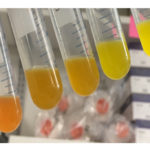A team led by University of Texas, Austin scientists has developed a more nuanced library approach to tuning gene expression in metabolic pathways. Compared to the traditional way, which leverages an all-or-nothing approach, they can now fine-tune the level of gene expression. In a study, they were able to identify variations of essential genes in metabolic networks that were missed using traditional approaches. The work appeared in the Proceedings of the National Academy of Sciences. Read more on the JGI website.
Biosciences Area Projects Receive Technology Commercialization Funding Awards from Department of Energy
Four Berkeley Lab projects were awarded $1 million from the DOE’s Technology Commercialization Fund (TCF) to further collaborative research with industry partners on biofuels, bioproducts, energy microgrid technology, and renewable energy technology. Two projects from the Biosciences Area were awarded funding for research to enable rapid strain engineering for the production of biofuels and bioproducts from low-cost gas feedstock, and produce a new aviation biofuel precursor from cellulosic biomass
JGI Helps Enable Chloroplast Mimics
In Science, a team led by researchers at the Max Planck Institute (MPI) for Terrestrial Microbiology and the University of Bordeaux have developed a platform that mimics chloroplast function within a cell-sized system. Photosynthesis harnesses carbon captured from the atmosphere in a process that generates energy. The MPI team led by Tobias Erb, director of the MPI for Terrestrial Microbiology, ultimately aims to develop an artificial photosynthesis pathway that would more efficiently remove carbon from the atmosphere than current natural processes and use it as a sustainable resource for making high-value bioproducts. The work was enabled in part through an approved JGI’s Community Science Program (CSP) Functional Genomic proposal from the Erb lab. Learn more here on the JGI website.
Biosciences Area FY21 LDRD Projects
The projects of 15 Biosciences Area scientists and engineers received funding through the FY21 Laboratory Directed Research and Development (LDRD) program.
Biosciences Area 2020 LDRD Projects
The projects of 14 Biosciences Area scientists and engineers received funding through the FY20 Laboratory Directed Research and Development (LDRD) program. The funded projects span a diverse array of topics and approaches including: developing closed-loop plastics from biogenic feedstocks; reimagining a root system optimized for plant-microbe interactions; and creating computational tools for extracting macromolecular conformational dynamics. Lab-wide, 96 projects were selected from a field of 168 proposals. Biosciences Area efforts account for 18.5 percent of the $23 million allocated.
Was this page useful?








